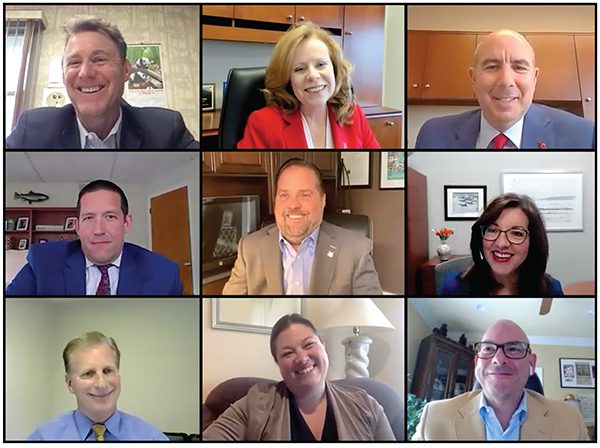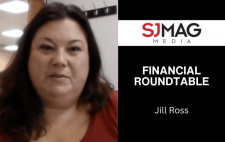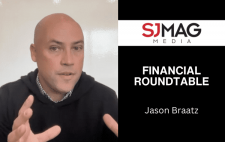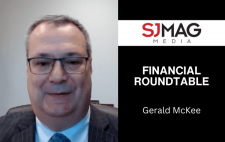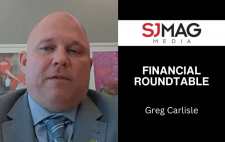To continue our Roundtable Series, we brought together a group of South Jersey’s experienced wealth management and banking professionals to discuss what’s happening in today’s economy – and how that affects you. While the world seems to be changing all around us (especially if you know what Bitcoin is or follow GameStop), these financial experts say not to worry, because when it comes to our economy, things that appear to change actually stay the same.
Participants:
Marianne Aleardi, Publisher, SJ Magazine
Joe Tredinnick, Market President Republic Bank
Lee Molotsky, Managing Partner SHM Financial Group
Ed Garruto, Certified Financial Planner M Financial Planning Services
Catherine Allen-Carlozo, Certified Financial Planner HFM Investment Advisors
Albert Fox, Certified Financial Planner Fox Penberthy & Dehn of Morgan Stanley
Rob Curley, Market President TD Bank
Jill Ross, CEO Flow Financial Therapy and Advising
Sharon Hammel, SVP/Chief Retail Officer Republic Bank
Mark Finelli, Founder Family Wealth Partners
What the past year has been like…
It was one of the most volatile environments we’ve ever witnessed. There were a lot of knee-jerk reactions But part of our job as advisors in this kind of environment is to make sure the ship is steadied as we go, and to keep people’s expectations intact.
Lee Molotsky
It was a great environment to learn what kind of leader you are. For me and for Republic, it was about being boots-on-the-ground, answering phone calls and reassuring people. It was a bit of a blur, because the PPP loan program made things quite interesting. It’s been very challenging, but in a good way.
Joe Tredinnick
We went through 2 bank mergers – we bought 2 banks. And we did a second-step conversion and went public. We moved everyone to working from home, and we dealt with Covid issues throughout our offices and branches, and of course, the PPP. We all worked a lot longer and harder.
Jill Ross
Business got very, very busy. We were working 12-hour days, trying to return all the phone calls. It was the same conversation 1,000 times: Is it going to be 14 days? Is it going to be 15 days? Are they going to come up with a vaccine? But ultimately, it didn’t make a difference. If you stayed away from the TV long enough not to panic, you made money in the last 12 months with your investments.
Mark Finelli
It was probably one of the proudest years I’ve had in the 32 years I worked for TD. I got to see the resilience of our people. It gave me a higher level of trust in my colleagues and my team that we could adjust to anything. We faced a lot of challenges, and we rose to the occasion.
Rob Curley
On financial lessons from the past year…
All banks have seen explosive growth of deposits. People have not been spending money as they normally would. They now understand the impact of saving for a rainy day. People have been conservative, because of the uncertainty, which I don’t see changing any time soon. This has been a lesson that, because we lived through it, it will be hard to forget.
Joe Tredinnick
One of the things we learned – as we talked everybody off the precipice – was that one of the keys to investment success is not really asset allocation, it’s actually the investor’s behavior. When markets are down, we can’t react with emotional decisions. That was probably the biggest lesson, and it was that way through the whole decline and then the recovery that followed.
Ed Garruto
If you think about how people spent their money previously, that is changing. They’ve analyzed what’s important to them – their home, their family – and they have new priorities. They’ve changed where they believe their focus should be, and that’s affected how they spend their money. I’m right there with them.
Sharon Hammel
 On conversations with clients…
On conversations with clients…
The conversations I was having last spring and summer were: “I don’t know if I’m going to be able to remain in business.” “I don’t know how I’m going to pay my employees.” “I don’t know if I can make my loan payments.” In most cases, it was just listening to what people had to say. They were scared. They wanted to talk about what was happening in their business, so it became more about giving them comfort that we were there for them, no matter what, and we were going to work through it with them.
Rob Curley
Something that’s important in business is not hiding. How you really relate to people is when you show a human element – that you’re in the same choppy seas as they are. Saying to clients, “I know what’s on your mind. It’s on my mind too.” It’s really just about being in front of people and telling the story.
Albert Fox
A number of us have been doing this for a long time, so we could say we’ve been there, done that with some of these crises, but this was unprecedented. But when you’ve been educating your clients, you’re not going to have a lot of them calling you in a panic, because they know they’re in it for the long term.
Catherine Allen-Carlozo
Advice for people who are in debt…
Create a plan to strategize how to get out of debt. The first step for a lot of people is to recognize that you are in debt. Look at your debt with the highest interest rates, and reduce that first. Focus on one part of your debt and try to get that to zero. Then look at the next one. Work with that strategy one by one. Then recognize you can build up your reserves. It will take time, but you’ll get there.
Sharon Hammel
I understand why customers took on debt, but focus on getting out of it as quickly as possible.
Rob Curley
Meet with your financial advisor or banker to talk about how to restructure the debt. There are programs available that can help.
Jill Ross
 How rules for investing changed…
How rules for investing changed…
If anything, the last year cemented all the fundamentals of investing: buy low and sell high, and stay through a bear market. If you did anything besides hold, besides follow those investment principles, you made a mistake.
Mark Finelli
I had a client call and say, “I remember what you said: Don’t sell when it’s low. Don’t get scared. Thank you so much.” Because that’s what it’s all about – your asset allocation and diversification, and not being emotional. If you stuck it out, you did well.
Catherine Allen-Carlozo
It’s important to reassess your risk tolerance more than any other activity. People think we’re back. Things are done. Everything is ok. That couldn’t be further from the truth.
Albert Fox
The recent GameStop run…
This is musical chairs. The music will stop, a group of people will go to sit down, and there will not be a chair. I don’t know when. I don’t know how hard some will fall. But if history is any guide, that’s coming.
Albert Fox
People have a fear of missing out. They see GameStop run up, and they want to be part of it, but it’s not a good thing. It’s a potential bubble.
Ed Garruto
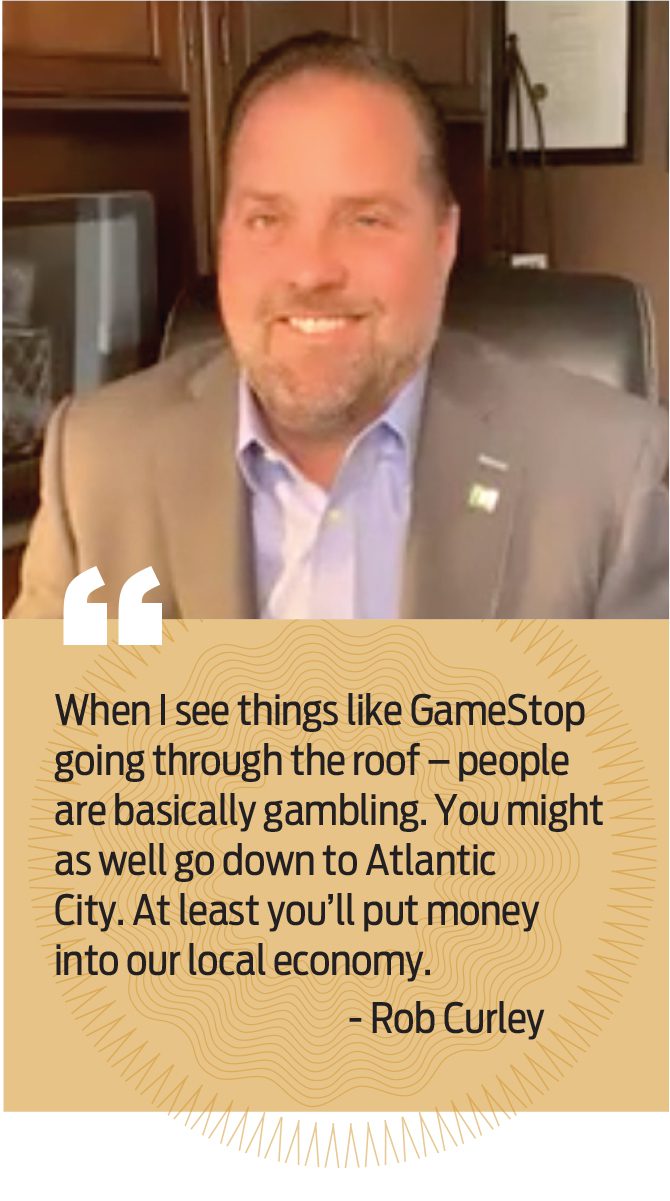 One good that may come out of this is we’ve built a new generation of people who are interested in the stock market. When I was in college, the dot-com bubble was going on, and that helped me at Rutgers–Camden say, “Hey, I’m going to go towards finance. This seems like fun.” This might be the same experience for the next batch of financial advisors coming out of college.
One good that may come out of this is we’ve built a new generation of people who are interested in the stock market. When I was in college, the dot-com bubble was going on, and that helped me at Rutgers–Camden say, “Hey, I’m going to go towards finance. This seems like fun.” This might be the same experience for the next batch of financial advisors coming out of college.
Mark Finelli
This has opened the door to conversations about investing. I’ve been able to provide that financial literacy to my 22-year-old and 24-year-old. Any time you can learn about investing and risks and reward, it’s a great opportunity.
Joe Tredinnick
What has changed with a lot of folks who are in their 20s, or maybe early 30s, is that they have an expectation of return without understanding the true risk of what they’re actually doing. My $1,000 investment is now worth $200,000. That’s not normal. It’s really not normal – not in the world that I live in.
Lee Molotsky
On the future…
I think investors have new concerns now with all this money in the system. Will there be inflation? Are interest rates going up? Will we successfully complete the vaccination process and eradicate Covid? There’s always something out there.
Ed Garruto
I’ve had some concerning conversations with people who think their spending is changed forever. I personally won’t buy into the “we’re never going to a sporting event or a theater or a restaurant again.” We’re still in the third or fourth inning of this thing playing out, but on the back end, I think it’s going to be more robust than people imagine.
Albert Fox
The question we need to ask ourselves is: what happens if there’s another setback? If things correct like they did in ’07 to ’09, how many years do we have to recover? And how do we make sure we have enough income to last throughout our lifetime?
Lee Molotsky
On inflation…
When everybody does get back to what will be the new norm, we’re concerned there’s going to be a somewhat significant amount of inflation. I don’t think many people are prepared for inflation and how that affects their portfolio. Most people don’t understand the effect of inflation on bonds and on the marketplace.
Lee Molotsky
The question is: How much inflation is there going to be over what the market already expects? In the rare instances when I go grocery shopping, I’m still delusional thinking I can buy 2 days’ worth of groceries for $75. And then I’m like, how did I spend $300? So what do you do about that? Well, you readjust your spending plan. You relook at your portfolio allocation. You can’t assume this time it’ll work itself out.
Albert Fox
People are buying cars who never bought a new car before, because they received stimulus money. I’m happy for them, but that’s going to have some kind of impact in the long run on the price of cars and on the price of everything related to cars. That’s just one example.
Rob Curley
Inflation might be bad for our retired clients, but let’s say you’re 30 years old and you’re buying your first home. The mortgage is $2,000 a month and you’re making $70,000 a year. But inflation runs up and now you’re making $150,000 a year, and your mortgage is still $2,000 a month. I certainly don’t want inflation, but there are people who benefit from it.
Mark Finelli
On retirement…
We have clients who might have accumulated a lot of money for retirement. We can’t get them to spend their money because they are so used to putting money away. I tell them, “Well, if you don’t spend some of it, then you’re leaving it all for the kids.” They say, “I don’t want to do that!” I try to explain that is what’s going to happen, but it’s hard to get that mindset to change.
Catherine Allen-Carlozo
I think people look at assets as the most important thing, but it’s really cash flow. And that’s where inflation comes into play. A lot of models over the last several decades have projected low inflation, because that’s what we’ve had. Now, all of a sudden, we’re in a position where we might have high inflation for the next couple of years. How does that change the models of cash flow projections for people who want to retire in the next 10 or 15 years?
Rob Curley
In retirement years, we’ve got to plan for a much, much, much higher taxation bracket. So you could have higher inflation, higher taxes and a market that’s not as cooperative as it’s been lately, which would put someone in a very precarious situation if they don’t have the right model in their portfolio. We need to dig deep as people approach retirement.
Lee Molotsky
Financial advice for someone under 30 who is starting out in their career…
Pay yourself first. Auto deduct straight from your paycheck right to your savings account, and do your 401(k) up to the match, at least.
Jill Ross
Make sure you have some life insurance and probably some disability insurance as well. You can’t anticipate what might happen in the future and you’ve got to take care of the people in your family.
Ed Garruto
I constantly tell my family members and my clients’ kids to save. Life only gets more expensive – it’s not going to be easier to save money when you have 3 kids and a pet that has to go to the veterinarian and you’ve got to pay for clarinet lessons, or wrestling practice or whatever other thing. It only gets harder to save money as you get older.
Mark Finelli
Advice for a couple about to be married…
Talk about who’s paying what. Some people have 2 separate bank accounts, and they split up what bills they’re going to pay. Some have 2 separate bank accounts, and they have a joint account where they each put a percentage of their income. Other people have a joint account, and the money comes out of that. It has to do with your comfort level. Maybe it starts out one way and evolves into something else. But you need to have the conversation.
Jill Ross
You want to know the other person’s money personality. I’ve seen where one person has a lot of college debt and then the other person doesn’t. They get married and now, all of a sudden, that other person has college debt. You want to know if the person you’re marrying has a lot of credit card debt or student loan debt. These are the kinds of conversations you should have. And it’s very difficult.
Catherine Allen-Carlozo
On having a budget…
I think it’s important for everyone to have a spending plan. That phrase feels better than budget. Budget sometimes feels constraining. So you start with what are your sources of income and what are all of your expenses? You work from there.
Albert Fox
You can’t create a budget by just looking at what you brought in this month, and what you spent. There are other months during the year when you’re going to spend more, whether it’s at Christmas or for someone’s birthday. Look at your spending over a few months to truly see what it is. You’ll never learn to save unless you know what you’re really spending. And most people – just like most of us when we’re counting our calories – don’t estimate that right.
Catherine Allen-Carlozo
Pay yourself first. Make that a line item on your budget. I don’t care how much it is. Start with any amount and, all of a sudden, years go by. I am very fortunate that I actually did that at a young age.
Lee Molotsky
Early in my career, I’d cash my paycheck, and we had envelopes. I’d put $25 in a gift envelope, $25 in the Walmart envelope, $100 in the rent envelope, and that was how we did it. It was something we eventually grew out of, but it set a good tone as a young couple that it was important to have a budget.
Joe Tredinnick
Advice for a young family just starting out…
People make the mistake of thinking their child is most expensive when they’re a baby. That’s not true. They get more expensive as they get older. As somebody with kids in their 20s, I can tell you it never ends. So be ready. Save.
Rob Curley
Don’t think you can afford a house just because you qualify for the mortgage. What you qualify for does not take into account things you spend money on that aren’t on your credit report.
Jill Ross
When you start out, you have visions of grandeur – the future looks great. But make sure you’ve accounted for the unexpected: how will you care for your children? How will you cover household expenses? What if there are medical expenses?
Sharon Hammel
Watch videos from the evening’s discussion here.


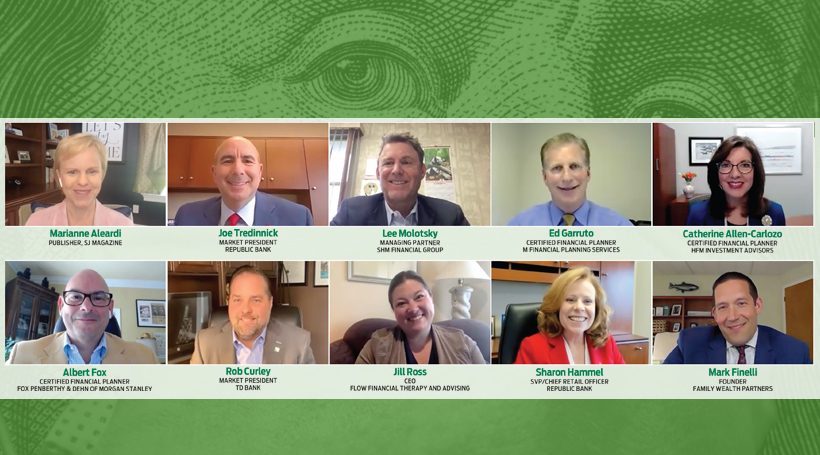
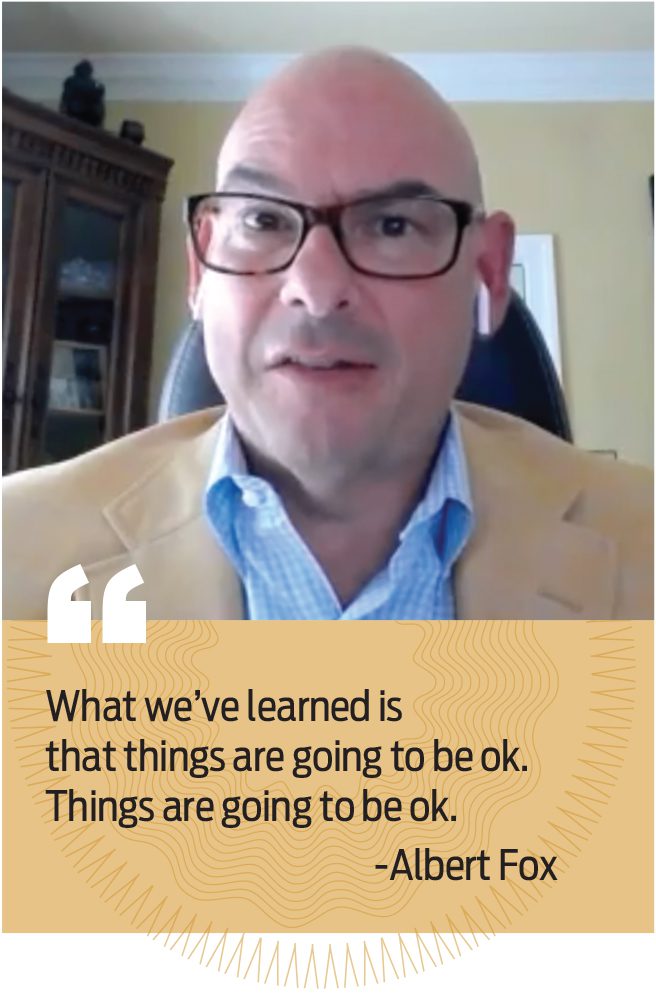 On conversations with clients…
On conversations with clients…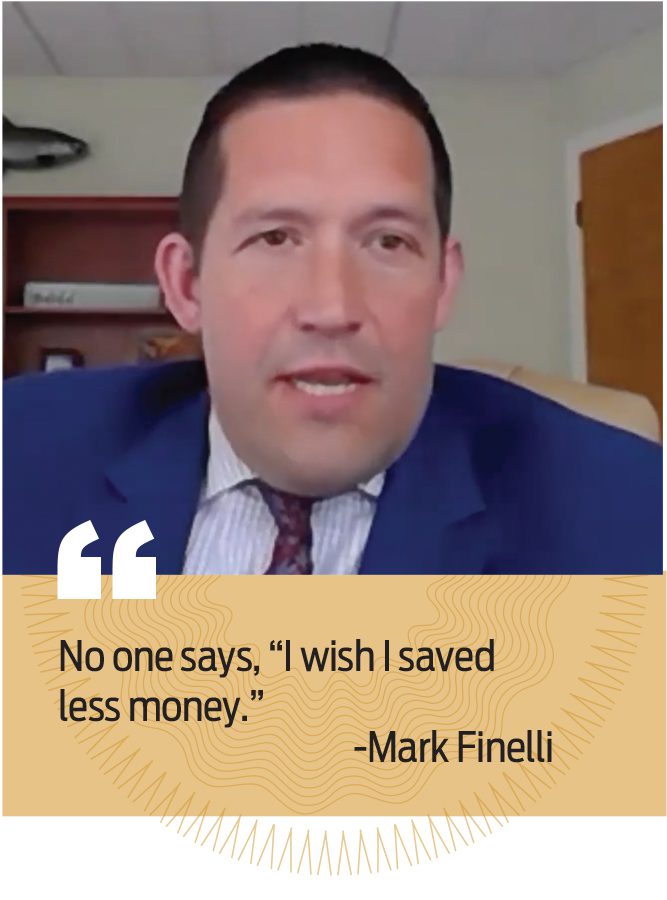 How rules for investing changed…
How rules for investing changed…